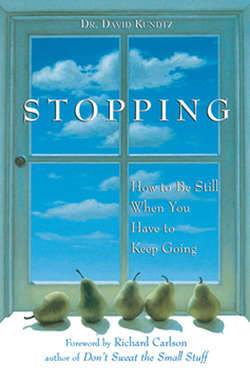Читать книгу Stopping - David Kundtz - Страница 15
На сайте Литреса книга снята с продажи.
ОглавлениеIf you can't meditate, vegetate.
MEN'S HEALTH MAGAZINE
8
Contemporary Contemplation
Stopping is not meditation as it is generally understood. It is a practice intended for citizens of the changing of the centuries who have no time to stop and smell the roses or the time or inclination to practice a whole system of daily meditation. It's for people who don't have time to fit in everything they are already obliged to do, never mind trying to fit in extras like meditating twice a day. Stopping is what I call contemporary contemplation. It is a variety of meditation for those too busy (or maybe moving too fast?) to meditate; it's a way to care for the soul for those who wouldn't otherwise have time.
Stopping is specifically designed for people who are looking for a simple, uncomplicated, non-dogmatic yet effective way to cope with a too-busy life. While respecting and teaching many of the concepts and practices of Eastern (for example Buddhist) systems, Stopping embodies the cultural outlook and customs of the western mind: it's brief, simple to learn, and effective.
From the time I first learned about meditation in my youth to well into the overbusy days of my adult life, meditation has been a challenge for me. It's not that I don't like it; I do. It's not that I have not done it; I have, for some periods of time, with success. I've also read many books on it. Certainly I know that when I do it, I benefit. It's just that I so often find my resistance to meditation stronger than my motivation. It's still hard to get it done. No doubt a simple case of the spirit is willing (but maybe not naturally inclined?) but the flesh is weak (or otherwise ill-adapted?).
Stopping, because it is less structured, works better for me and for many of my clients, although the end results and some of the processes are almost the same as those of meditation. While I still occasionally meditate in a formal, somewhat structured way, I am always Stopping—many times a day, many more times a month, many, many more times a year. I don't find myself resisting Stopping as I do meditation. In fact, I look forward to it.
Perhaps it is a matter of personal preference. The words of Dr. Rachel Naomi Remen, a pioneer in training doctors in relationship-centered care, apply so well here: “I am not much of a meditator,” she says in her book Kitchen Table Wisdom. “No matter. I have come to suspect that life itself may be a spiritual practice. The process of daily living seems able to refine the quality of our humanity over time.” Yes. The intention of Stopping is to help us notice, enrich, and augment “the process of daily living.”
One of the purposes of any kind of contemplation is to awaken us, to help us to be in the present moment, so that in the moments ahead we will be on the right track. The word contemplation has Latin roots in words that indicate an intensive time spent in the temple to be aware of the signs and omens of the times. Contemplation prepares us for the present moment (and thus for whatever is next) and for what we need to notice now to enjoy success in whatever we are beginning.
I learned the hard way that if I undertook a self-improvement or spiritual project—anything from trying to lose a few pounds or quitting cigarettes to trying to be more patient with a difficult co-worker or less angry and aggressive while driving in traffic—it was doomed to failure if I did not begin the project from a Stopped position. In this way, Stopping is a preparation for the challenges that face us at every turn and even the challenges that we propose and welcome.
The reason why so many of our well-intentioned projects fail is not from a lack of goodwill, not from a failure of willpower or determination, and not from a moral or character weakness. It's that we start these projects from a too-busy, distracted, and unfocused position. It's no wonder they often fail. So Stopping is a first step, a beginning, a prelude. It's the condition we need to be in so that our projects succeed. Beginners are welcome here.
A too-busy, distracted, and unfocused life also kills the power of imagination, an essential part of any healthy life. If we cannot imagine what we dream or passionately desire, we will never be able to realize it. Stopping is a friend of imagination. During a time of Stopping, our imaginations are given space and encouragement to soar.
Stopping is also a primer for some of the more challenging spiritual books and systems that are offered today in such large numbers and various forms. Stopping allows you to be more receptive and positively critical, more frankly understanding or confused, and, ultimately, more successful in whatever you are attracted to adopt and practice.
Stopping can help bring you to the right teacher, can help you recognize your teacher when he or she appears, and can help you to understand that all good teachers should respect your wisdom and shouldn't take themselves too seriously. In that vein, it seems appropriate for to me to say that if Stopping does not do for you what I am saying it can, if it does not bring you into contact with your important questions, and it does not help you to become more awake and remember who you are and what you want, then, of course, you must reject it out of hand.
